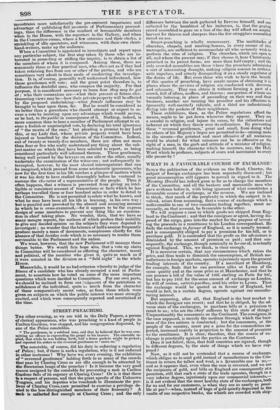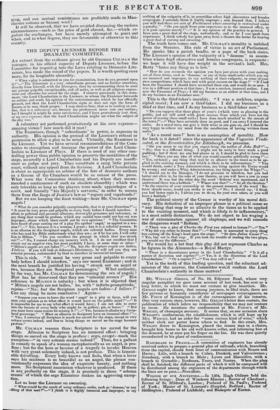WHAT IS A FAVOURABLE COURSE OF EXCHANGE?
SINCE the publication of the evidence on the Bank Charter, the subject of foreign exchanges has been repeatedly discussed ; but great misconception still appears to prevail in regard to it. The Morning Herald has indeed gone so far as to charge the members of the Committee, and all the bankers and mercantile men who gave evidence before it, with being ignorant of what constitutes a favourable course of exchange, or the reverse. We are inclined to think, that much of the perplexity in which the subject is in- volved, arises from assuming, that a course of exchange which is unfavourable to one of two countries trading together, must ne- cessarily, on that account, be favourable to the other. We will suppose a case in which goods are shipped from Eng- land to the Continent ; and that the consignee or agent, having dis- posed of the cargo, goes into the market for the purpose of invest- ing the proceeds in a remittance to his London correspondent. He finds the exchange in favour of England, as it is usually termed ; and is consequently obliged to pay a premium for his bill, or to purchase gold. It is contended that the profit on the adventure is diminished by the amount of premium so paid; and that con- sequently, the exchange, though nominally in favour of, is actually against England. This, we think, is clear enough. It is moreover certain, that any circumstance which raises the price, and thus tends to diminish the consumption, of British ma- nufactures in foreign markets, operates injuriously upon the general trading interests of the country. If a merchant at Hamburg, for example, finds that he can purchase silks at Lyons of the same quality and at the same price as at Manchester, and that he can procure a bill of the value of 1001. sterling on Paris for 381., but has to pay 1031. for the same amount of exchange on London, he will of course, cceteris paribus, send his order to Lyons. Thus the exchange would be quoted as in favour of England, but would in fact, in a certain degree, operate against our manufac- turing interest. But supposing, after all, that England is the best market to which the foreigner can resort; and that he is obliged, by the ad- verse state of the exchanges, to purchase bills at a premium to remit to us; who are the chief sufferers by this state of things? Unquestionably the consumers on the Continent. The consignee, in the case supposed, is merely the medium through which the busi- ness of the two nations is conducted ; but the consumers, or the people of the country, must pay a price for the commodities im- ported, increased exactly in proportion to the amount of premium on the remittance. It is clear, therefore, that the course of ex- change is practically against the parties on the Continent. Does it not follow, then, that both countries are injured, though in different degrees, by the state of things which we have sup- posed ? Now, as it will not be contended that a course of exchange, which Obliges us to send gold instead of manufactures to the Con- tinent in return for tallow and wool, is a favourable one to us,— and as it appears that, even when the case is reversed, •and we are the recipients of gold, and bills on England are consequently ata premium, still that such a state of the trade operates, though in a very inferior degree, injuriously upon our commercial interests,— is it not evident that the most healthy state of the exchanges, both for us and for our customers, is when they are as nearly as possi- ble at par?—when, instead of bags of gold quietly.deposited in the vaults of our respective banks, the wharfs are crowded with ship-
ping, and our mutual remittances are profitably made in Man- chester cottons or Saxony wool?
It will be observed, that we have avoided discussing the various circumstances--such as the price of gold abroad, &c.—which re- gulate the exchanges, but have merely attempted to point out when, and in what degree, they are favourable or otherwise to this
country.




























 Previous page
Previous page